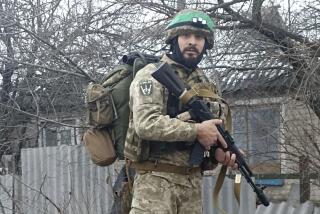A FARC rebel in Colombia explains why he wanted out
BOGOTA, Colombia — Leftist rebel Reinel Usuga surrendered this month because he was afraid of dying in battle and being buried in an unmarked grave even as rebel leaders negotiate a possible peace agreement that would make such a death pointless — perhaps even absurd.
But Usuga, 30, a squad commander with the 57th Front Revolutionary Armed Forces of Colombia, said in an interview days after his surrender that another issue irked him: The apparent “comfort” of rebel leaders negotiating in Cuba was an irritating juxtaposition to the everyday risks he and his comrades were facing in the jungle.
“We all realize they are living in better conditions than those of us in the line of fire,” said Usuga, a 10-year veteran of FARC, Colombia’s largest and apparently dwindling rebel group. “There are no safe zones left in the 57th Front. Just when it seems quiet, something happens, a bombardment or ground attack. The armed forces were always on top of us.”
The pace of defections of FARC rebels has increased — 500 this year as of May 18, up 6% from the same period in 2012 — possibly because of the peace talks in Havana between Colombian government and rebel leaders, now in their eighth month, and the prospects that hostilities could soon end.
“In any war, no one wants to be the last one to die,” said a government official, who spoke on condition of anonymity. Although no agreement has been signed, rumors are swirling that the two sides could announce an accord on the first of five major points: a deal on land reform.
On May 3, Usuga was airlifted by Colombian police helicopter from Acandi, in Choco province, with 10 members of the FARC unit he commanded. Three months ago, his squad numbered 19. Then, one by one, eight rebels gave themselves up.
The group turned over 16 rifles and grenade launchers, for which they’ll be paid bonuses of up to $750 each.
Usuga’s unit includes his sister, Sandra, 28, and her partner, Aldair Palacios, 36. All are now undergoing a three-month demobilization process in Bogota. They’ll be given medical care, psychological counseling, education and a $250 monthly stipend to start new lives.
Usuga said he decided a year ago that FARC was a lost cause and that he wanted out, but he waited so he could persuade his entire squad to surrender with him.
Demobilization is on most rebels’ minds these days, he said. The ranks of his 57th Front has shrunk to no more than 150 fighters, from 450 several years ago. The FARC of old is no more: The arms training classes and the nightly political discussions went by the wayside long ago.
“I had to move very carefully because you never know what’s in the mind of another person, if they are in agreement or not. FARC kills anyone who tries to leave the ranks. So I started with my sister and her partner, Aldair, and person by person we brought everyone around to the idea of demobilizing,” Usuga said.
Through a friend, Usuga made contact with a Colombian police undercover agent in Acandi who arranged the logistics of their surrender.
Sandra said she missed her 10-year-old son and wanted a better life for him and the child she is expecting with Palacios. That is what made her seek a new life. The couple said they joined FARC mostly because they had to choose sides in a war between leftists and right-wing paramilitaries.
Pressure from the armed forces — and the vigilance of FARC commanders who threatened all deserters with death — kept the pair in the ranks longer than they wanted.
“I want nothing more to do with war,” Sandra said. “I just want to live a different life with my family in peace.”
Reinel Usuga said that he was eager to return to life on the farm where he grew up, but that he still faced rebel reprisal.
“One thing has been clear from the moment I took the decision, that my enemy from now on is FARC,” he said. “I’ll have to be careful to avoid territory where they have influence. I’m not afraid, just aware.”
Kraul is a special correspondent.
More to Read
Sign up for Essential California
The most important California stories and recommendations in your inbox every morning.
You may occasionally receive promotional content from the Los Angeles Times.










